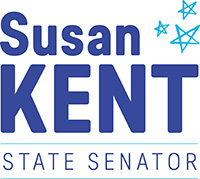Kent said the Legislature’s “number one job” is coming up with a budget for the next two years.
“We don’t get to act like Congress – we have to balance our budget,” she said.
Rivertown News
Irresponsible budgeting jeopardizes our future
Fiscal stability has been a top priority for me since I first ran and was elected in 2012. On this page and in many other forums, I have advocated for fiscal policies that avoid the past repeated cycles of structural deficits, which led to underfunding our K-12 schools, colleges and universities, public safety, seniors, people with disabilities and our veterans.
Woodbury Bulletin
By Senator Susan Kent to Woodbury Bulletin
Fiscal stability has been a top priority for me since I first ran and was elected in 2012. On this page and in many other forums, I have advocated for fiscal policies that avoid the past repeated cycles of structural deficits, which led to underfunding our K-12 schools, colleges and universities, public safety, seniors, people with disabilities and our veterans.
This has also been true of Governor Dayton. When he took office in 2011, he promised to build a Better Minnesota – and that’s exactly what he’s done. Back then, our economy was in crisis and our budget was a mess. After years of cuts and underinvestment under former Governor Pawlenty, our schools were turning to local property tax increases to minimize the cuts in our classrooms. Together with the governor, we worked hard to right the ship. Now our economy is strong, unemployment has reached a 17-year low, and our schools have seen significant support, although we’re still not caught up. DFL leaders have stabilized our state’s budget with nine forecasted budget surpluses over the last seven years and secured $1.9 billion in cash and reserves to protect our state’s finances from future economic downturns.
All of that work would have been undermined if Governor Dayton hadn’t vetoed the tax and budget bills this year. Tax cuts and new spending need to be balanced in order to protect Minnesota’s economy from future instability. Unfortunately, the proposals that were on the table here at the end of session didn’t provide that balance.
The budget bill had some good parts to it, but those things didn’t outweigh controversial provisions that would have hurt our state’s fiscal stability. The bill would have cut funding from state agencies and avoided the kinds of necessary investments and forward-looking solutions we need to address the issues that are critically important to Minnesotans right now: it didn’t do nearly enough to ensure our schools and roads are safe or help make our health care accessible and affordable.
The same is true for the tax bill. Governor Dayton and I shared a commitment to conforming Minnesota’s tax policy with recent federal changes in a way that would not be at the expense of working families, and that would not lead back to structural deficits. The tax bill we saw on the floor in the Minnesota Senate – which the Governor vetoed once before having basically the same bill sent back again at the close of session – would have budgeted our state right back into deficits. The Senate bill gave tax rate cuts to everyone, but the benefits were skewed to the wealthiest, leaving working families with a nominal benefit. The combined cost of the individual and corporate tax rate cuts once fully phased in was $565 million per biennium. That kind of inequality is a risky way to budget and doesn’t reflect the priorities of Minnesotans. I am deeply frustrated that political games were played with this important bill, especially with advance knowledge that it would not be signed into law.
While I spent this legislative session watching for irresponsible spending like this year’s budget and tax bills, I also advocated for a meaningful bonding bill. Bonding bills provide needed investment for our state’s infrastructure, including higher education, transportation, and veterans home projects. This year’s proposal, however, fell short in fixing real problems. The bill ignores urgently-needed maintenance for public safety and critical infrastructure across Minnesota. The bill doesn’t honor the commitments of previous investments made by taxpayers – it seems like every year we put off fixing our state-owned buildings and infrastructure. That just makes our problems worse and Minnesota falls further behind on preserving our assets.
We have a lot of work to do to keep building a Better Minnesota, and this year’s budget and tax proposals just weren’t up to the job. We must return to a responsible balance of tax cuts, spending, and investing in our future. This one-sided approach to budgeting will jeopardize the progress Governor Dayton and DFL leaders have made. Our state’s fiscal stability is at stake, and we must stand up and protect it for our – and our kids’ and grandkids’ – future.
Gov. Dayton to Give $3 Million Boost for Gold Line Bus Project
“If we don’t have a balanced transit system…it means we’re losing out on opportunity,” said Sen. Susan Kent of the Gold Line bus project.
Woodbury Bulletin
Senator Kent Secures $13 Million to Address School Staffing Issue
Senator Kent secures $13 million in state funding to address the school staffing issue facing Minnesota, demonstrating strong commitment to schools.
Why a New Education Data Law is so Important to Minnesota’s Asian and Pacific Islander Community
Senator Kent strongly supports protecting the education data of our children. Here’s why it especially important to certain communities in Minnesota.

